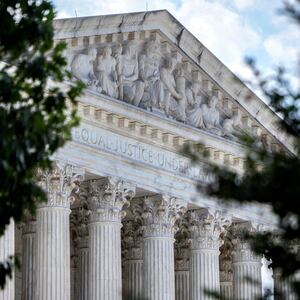The reversal of the Chevron case by the young Turks, angry old men, and Chief Justice John Roberts who make up the Supreme Court’s conservative majority checked off an important box in the Federalist Society’s checklist for reshaping America.
All revolutions must start with sowing chaos, and chaos is what will ensue from the reversal of Chevron U.S.A. versus Natural Resources Defense Council, the case that established the 40-year-old precedent of giving deference to the expertise of federal agencies.
Known as “Chevron Deference,” the decades-old doctrine simply means that courts assume that federal agencies know what they’re doing when it comes to enforcing regulations in their area of expertise. Thus, when a court determines that a law the agency is supposed to administer contains some ambiguity then the court should defer to the agency’s expertise.
It might seem like common sense to believe that an agency like the U.S. Fish and Wildlife Service would know more about, say, the proper classification of the Western gray squirrel—the example given by dissenting liberal Justice Elena Kagan—than a rando judge. But common sense never stands in the way of the revolution.
The 1984 case of Chevron did not create the concept of deferring to agency expertise. There have been agencies since the 18th century in our country, but a surge of them occurred during the New Deal era under President Franklin Delano Roosevelt, planting the seeds of many of the progressive policies we have today that conservatives dub “the administrative state.”
The courts of that time—including the high court—grappled with the legal issues that arose before them. During that period, as recounted in Chief Justice Roberts’ majority opinion, agency deference also was applied in such cases as Gray v. Powell, where the court deferred to an agency definition of a “producer” under the Bituminous Coal Act of 1937, and N.L.R.B. v. Hearst involving the National Labor Relations Board’s definition of whether a “newsboy” was an employee. Then, as now, agencies acted at a macro and micro level to serve as a check against what otherwise might be pure profit-driven policies that favor business profits over the protection of consumers, workers, species, and the environment.
But not always. Ironically, the Chevron case itself deferred to the Reagan Environmental Protection Agency’s pro-pollution view of the Clean Air Act and allowed an easing of emission standards. That’s something we can all remember Reagan for as the country and world face historically life-threatening heat waves. But as detailed by Charlie Savage for The New York Times, the conservative campaign against the potentially anti-business profit effect of agency regulations has been long in the works.
He reports that a once-secret memo authored for the U.S. Chamber of Commerce in 1971 by a tobacco industry lawyer “proposed a plan to transform public opinion and build political influence to roll back the administrative state.” The lawyer behind it, Lewis F. Powell Jr., would soon be appointed to the Supreme Court by President Richard M. Nixon.
Savage chronicles how this movement developed over the next decade in the form of the Federalist Society that spent decades grooming young conservative lawyers—an effort eventually resulting in the current conservative majority on SCOTUS (a majority that includes Justice Neil Gorsuch, whose mother was an anti-regulatory chief of the E.P.A. under Reagan).
Gorsuch’s concurrence is revealing when he writes that the story of Chevron is “[a] revolution masquerading as the status quo.” As always, the Republican extremist views tend to project their own motivations onto others. It’s Gorsuch who is helping lead a revolution. It’s a revolution hardly slowed at all by stare decisis—the jurisprudential doctrine of determining new cases based on old ones. The Chevron case has been in place for 40 years, and is one of the most cited cases in American law.
But there’s no reason to expect this Supreme Court will be put off by the prospect of overturning 40 years of precedent when it saw no problem with getting rid of Roe v. Wade, which had stood for nearly a half-century. As Justice Kagan put it in her dissent from the reversal of Chevron: “The majority disdains restraint and grasps for power.”
Perhaps, it is some kind of multi-generational conservative trauma passed down since the New Deal that motivates their obsession with dismantling the protections of the administrative state. But like any trauma, the effects can be illogical and have far-reaching, destructive consequences.
As noted by Justice Kagan, reversal will cause “massive shock” to the legal system, causing “some agency interpretations never challenged under Chevron [but which] now will be.” Some of Justice Kagan’s examples point out the ludicrousness of having judges decide such questions as when does an alpha amino acid polymer qualify as a “protein” or the earlier cited example of whether a particular species of gray squirrel is distinct based on the location of the population. But that may be the very point. After all, it’s a much bigger task to replace all the career employees at agencies with political appointees who will do the bidding of a conservative administration than it is to just have a cadre of a few hundred conservative judges backed up by six justices do all the work.
The reversal of Chevron assures the Roberts court of its place in history as a court that seeks to consolidate the reins of power over Americans in nine unelected public officials. But its place in history will also include the accomplishment of driving public confidence in the high court to record lows that may ultimately fuel reform of the Court itself through greater ethics oversight and even dilution of its power through expanding its size.
If those much-needed changes come to pass then Chief Justice Roberts and his conservative majority may well come to exemplify the quote from the Greek tragedy Euripedes: “Whom the Gods would destroy they first make mad.” This Supreme Court is mad with power. That madness may prove to be their undoing, but it most certainly is proving to be the undoing of many valuable rights and protections for the rest of us.
Shan Wu is a former federal prosecutor who served as counsel to Attorney General Janet Reno







